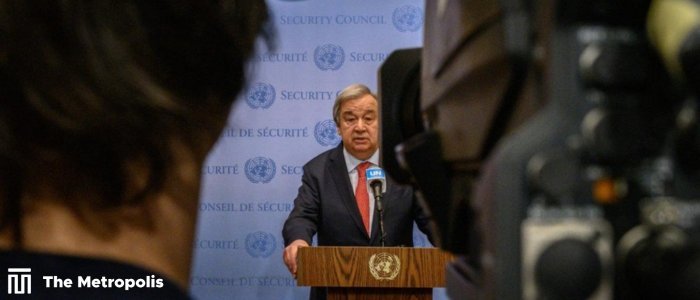“In our fractured, troubled world, it is incumbent upon states to preserve our universal institution, in which they have a stake,” UN chief Antonio Guterres says. (AP)
Metropolis Desk-
The world is moving toward a new multipolar age, which Secretary-General Antonio Guterres declared to the world’s states on Thursday, and the world is already seeing the highest degree of geopolitical tensions and major power struggle in decades.
He emphasized that the United Nations’ core principle of having all nations cooperate to address global concerns is being threatened by these differences.
The UN chief listed several difficulties: more deadly and complicated conflicts; resurgent fears of nuclear war; wide-spread inequality within and between nations; the climate emergency; growing mistrust of public institutions; and attacks on human rights all over the world, “including a pernicious pushback against women’s rights.”
The secretary-general claimed that it has become even more challenging to solve these issues as a result of Russia’s invasion of Ukraine in February 2022. And he expressly attacked Russia without naming it, stating that “the right to peace would be guaranteed” if all nations upheld their commitments under the UN Charter, which include preserving the sovereignty and territorial integrity of all states.
Guterres gave diplomats from the 193 member nations of the UN a policy document presenting his “New Agenda for Peace” in which he laid out his pessimistic assessment of the world. According to him, it is an effort by the UN to handle the emerging threats.
The head of the UN emphasized how crucial it is to maintain multilateralism, saying: “In our fractured, troubled world, it is incumbent upon states to preserve our universal institution, in which they have a stake.”
“The time to act is not when the divisions and fractures have engulfed us,” he declared. “Now is the time to act.”
Following the dissolution of the Soviet Union and the conclusion of its Cold War with the United States, then-UN Secretary-General Boutros Boutros-Ghali introduced the original Agenda for Peace in 1992. The UN should strengthen its work on preventive diplomacy, peacekeeping, and peacebuilding, as it welcomed the elimination of “hostility and distrust” between the superpowers.
The International Crisis Group’s UN director, Richard Gowan, stated that the organization has been operating under the tenet “of an activist, interventionist UN” for the previous three decades. However, he noted that Guterres’ “New Agenda for Peace” emphasizes that diplomacy must serve as “the driving force for a new multilateralism.”
While peacekeepers have saved millions of lives, according to Guterres, “longstanding unresolved conflicts, driven by complex domestic, geopolitical, and transnational factors, as well as a persistent mismatch between mandates and resources, have exposed its limitations.” He stated unequivocally that “peacekeeping operations cannot succeed when there is no peace to keep.”
His suggested peace agenda exhorts countries to adopt “nimble, adaptable” peacekeeping models with exit strategies and to support “peace enforcement action by regional and sub-regional organizations,” as directed by the Security Council, financed by UN member states, and supported by political efforts to advance peace.
No continent is more in need of this new wave of peace enforcement operations than Africa, according to Guterres.
The UN hopes that the Summit of the Future, which will be held in September 2024, will result in the adoption of a new vision for the years ahead that reflects the state of the world today while preserving multilateralism. The “New Agenda for Peace” is one of several policy papers the secretary-general is urging all nations to consider before the Summit of the Future.
Following Guterres’ speech, various nations expressed their initial opinions on the suggested agenda, which received largely enthusiastic support from the European Union and other groups. Egypt, however, criticized several of the suggestions as being overly ambitious, and Russia cautioned against interfering in domestic affairs while criticizing the agenda’s strong focus on human rights and called its treatment of climate change controversial.
Source- Arab News



